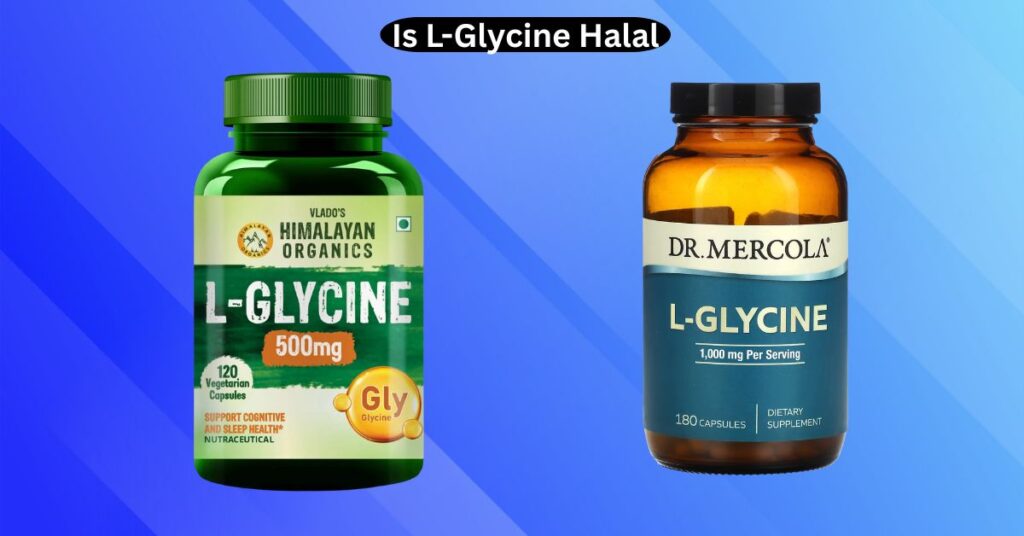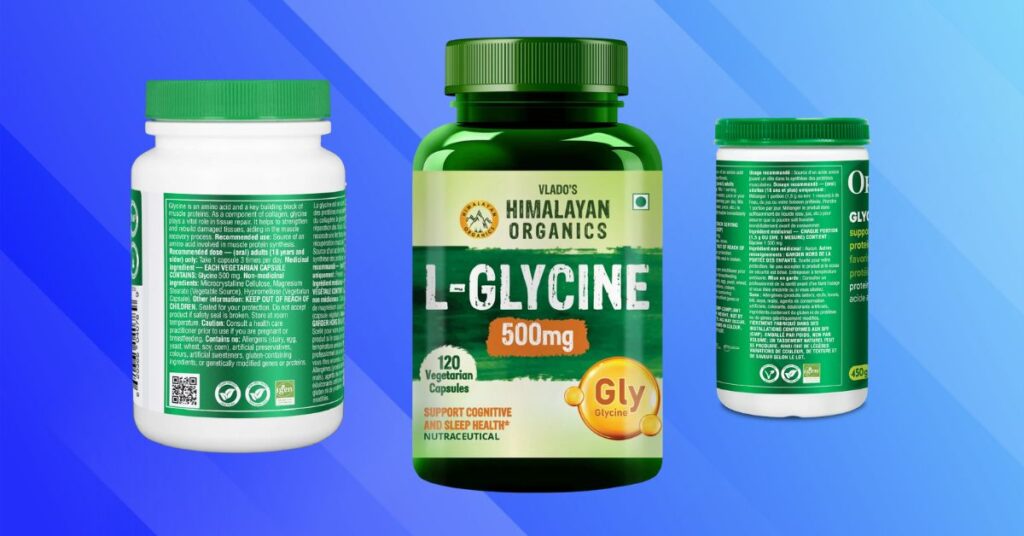L-Glycine is a naturally occurring amino acid found in foods, supplements, and even cosmetics — but for many Muslims, the question remains: Is L-Glycine halal or haram?
The answer depends mainly on its source and production process. When made synthetically or from plant-based ingredients, L-Glycine is halal and permissible.
However, if it’s derived from animal gelatin or collagen, its halal status becomes doubtful.
This guide explores the halal certification, sources, and uses of L-Glycine (E640) so you can make informed, faith-aligned choices with confidence.
Is L-Glycine Halal or Haram?

Yes, L-Glycine is halal when it’s made from synthetic or plant-based sources. Most commercially available glycine today is produced through chemical synthesis, meaning it doesn’t involve any animal ingredients, making it halal-safe for Muslims.
However, when glycine is derived from animal gelatin or collagen, especially if the source isn’t clearly mentioned, it can be considered mashbooh (doubtful).
To stay on the safe side, always check for halal certification from trusted authorities. This ensures the glycine you use in foods, supplements, or cosmetics truly meets halal standards.
You might also like: Is Whey Protein Halal or Haram?
What Is L-Glycine?
L-Glycine is the simplest amino acid, often used in foods, supplements, and medicines. It plays a vital role in building proteins and supporting overall health.
In the food industry, it’s recognized as E640, a flavor enhancer and stabilizer. L-Glycine can be produced naturally from plants or synthetically in laboratories, both of which are halal-safe.
Because of its versatile nature, it’s found in protein powders, sweeteners, and even cosmetics.
Understanding how it’s made helps determine whether your glycine source is halal, vegan, or plant-based.
How Is L-Glycine Made? (Manufacturing Process)
L-Glycine can be made in different ways. The most common halal-safe method is chemical synthesis, using ingredients like chloroacetic acid and ammonia — a process free from animal products.
Some manufacturers also use plant-based fermentation, which produces vegan and halal glycine.
However, if it’s derived from animal gelatin or collagen, the source may be doubtful unless halal-certified.
Understanding how your glycine is made is key to knowing whether it’s permissible in Islam. Always check the manufacturer’s process and halal certification for full assurance.
When L-Glycine May Be Non-Halal
L-Glycine becomes non-halal when it’s made from animal sources like gelatin or collagen from pigs or non-halal-slaughtered cattle.
Some factories also use alcohol-based solvents or mix animal-derived ingredients during processing, which can make the product haram or mashbooh (doubtful).
Cross-contamination in non-halal production lines is another concern. If the label doesn’t clearly mention the source, it’s safest to avoid it.
Always buy from reliable halal-certified suppliers who clearly state the origin and certification details of their glycine products.
How to Check If Your L-Glycine Is Halal Certified
To confirm if your L-Glycine is halal, start by checking the product label or manufacturer’s website for halal certification logos from recognized authorities like JAKIM, IFANCA, MUI, or PSQCA.
Ensure the certificate is valid and issued to the actual supplier. You can also contact the manufacturer directly or search for the brand name on halal certification databases. Reliable suppliers display certificates publicly.
By verifying documentation, you can be confident that your glycine meets halal standards and is safe for consumption.
Halal vs. Vegan vs. Synthetic Glycine — What’s the Difference?
Although vegan and synthetic glycine are usually halal, they aren’t always the same. Vegan glycine is derived from plant or microbial fermentation, while synthetic glycine is made from chemical reactions without animal inputs.
Both are halal-safe when processed cleanly. However, vegan doesn’t automatically mean halal, since it still depends on manufacturing conditions.
Understanding the differences helps you pick products that are both halal and ethically sourced.
Always check for verified halal certification to ensure full compliance with Islamic dietary standards.
Is Glycine Halal in Supplements, Cosmetics, or Foods?
Yes, glycine is commonly used in food flavorings, skincare, and dietary supplements — but the halal status depends on the source.
In supplements, it’s often synthetic or plant-derived, making it halal. In cosmetics or pharmaceuticals, animal-based glycine can appear, so verify before use.
When purchasing protein powders, amino blends, or creams, look for halal-certified logos on packaging. Halal glycine ensures purity and peace of mind for Muslim consumers across food, health, and beauty products.
Certified Halal Glycine Manufacturers & Products (Examples)
Several trusted companies produce halal-certified glycine. Brands like Foodchem, Avid Organics, and Accobio provide certificates from recognized halal authorities.
Always verify authenticity by checking certificate validity dates and issuing bodies. Halal manufacturers clearly list production methods — synthetic or plant-based — to assure customers of compliance.
Buying from such suppliers helps avoid mashbooh products and ensures the glycine you use in foods or supplements meets halal standards. Supporting certified producers encourages more transparency in the global halal market.
Common Misconceptions About L-Glycine
Many believe that all L-Glycine is automatically halal, but that’s not true. While most synthetic glycine is halal, some animal-derived forms may not be.
Another misconception is that glycine production involves alcohol — in most modern factories, this isn’t the case.
Some also think vegan glycine always equals halal, but halal certification still matters. Understanding these myths helps Muslim consumers make informed, faith-conscious decisions and choose products that align with both science and halal principles.
Scholar Opinions & Religious Viewpoints

Islamic scholars generally agree that L-Glycine is halal if derived from synthetic or plant sources. However, when glycine is produced from animal gelatin or collagen, it falls into the mashbooh category unless proven halal. Scholars emphasize the importance of verification and transparency from manufacturers.
Following the Quranic principle of avoiding doubtful substances, Muslims are encouraged to buy only halal-certified products. This approach ensures both religious adherence and personal assurance when consuming glycine-based foods or supplements.
You might also like: Is Eating Frog Meat HALAL?
FAQs About L-Glycine and Its Halal Status
1. Is L-Glycine halal and vegan?
Yes, L-Glycine is halal and vegan when it’s made from synthetic or plant-based ingredients. Always confirm with a halal certification.
2. Is glycine made from pork gelatin?
Some older or animal-based glycine types may come from gelatin or collagen, which can be haram if the source isn’t halal-certified.
3. How can I check if a product’s glycine is halal?
Look for trusted halal certificates from bodies like JAKIM, IFANCA, or MUI and verify them online.
4. Does glycine contain alcohol?
No, synthetic glycine doesn’t use alcohol in its production process.
5. What is glycine E640 in food additives?
It’s a flavor enhancer and stabilizer widely used in foods, and E640 is halal when made synthetically.
Final Verdict — Should You Use L-Glycine?
In conclusion, L-Glycine is generally halal, especially when produced synthetically or from plant-based ingredients. It’s safe for Muslims to use in foods, supplements, and cosmetics if verified by a trusted halal certification body.
Avoid glycine from animal or unclear sources, as it may be mashbooh (doubtful). The best approach is always to check the manufacturer’s certificate and choose reliable, transparent brands.
By doing so, you can confidently use halal glycine (E640) without compromising your faith or dietary standards.
Fahad Ali is a youth mentor and social activist committed to empowering the next generation of Muslims. By addressing contemporary issues through an Islamic perspective, He guides young minds in navigating faith, identity, and personal growth in today’s world.